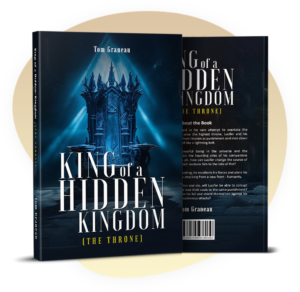In King of a Hidden Kingdom: THE THRONE, Tom Graneau intricately weaves the theme of predestination into the story of Lucifer’s rebellion and humanity’s creation. The narrative portrays God’s omniscience and foresight, revealing how every event—Lucifer’s fall, the creation of humanity, and the cosmic conflict—fits into a larger, unchangeable divine plan. This exploration of predestination raises profound questions about free will, justice, and the ultimate purpose of creation.

God’s Foreknowledge and Sovereignty
From the beginning, Graneau emphasizes God’s omniscience. Lucifer’s rebellion, though monumental, does not catch God by surprise. The heavenly battle is described as an event anticipated by divine foresight. Lucifer’s defeat and exile to Hell are swift and decisive, highlighting the futility of opposing God’s will.
The creation of Hell itself is portrayed as part of God’s plan—a realm designed to contain rebellion and serve as a reminder of divine justice. Even Lucifer’s throne, inscribed with “King of a Hidden Kingdom,” is described as being placed in anticipation of his betrayal. This detail underscores the inevitability of events and the unassailable nature of God’s purpose.
Lucifer’s Role in the Divine Plan
While Lucifer’s actions are rooted in pride and defiance, they ultimately serve a role within the divine plan. His rebellion sets the stage for the unfolding of God’s justice and mercy. Graneau’s narrative suggests that even acts of resistance are woven into the fabric of predestination, contributing to the larger story of redemption.
Lucifer’s manipulation of humanity, though intended to undermine God, also highlights the complexity of predestination. By exploiting human free will, Lucifer becomes a catalyst for the spiritual growth and moral choices that define humanity’s relationship with God. His actions, though malevolent, reveal the depth of God’s wisdom in creating beings capable of both sin and redemption.
Humanity and the Intersection of Free Will and Predestination
The narrative of Adam and Eve in King of a Hidden Kingdom illustrates the delicate balance between free will and predestination. Their creation in God’s image, their placement in Eden, and their eventual fall are all foreseen by God. Yet, they are granted the autonomy to make choices, highlighting the coexistence of divine sovereignty and human agency.
Graneau portrays humanity’s free will as an integral part of the divine plan. While Lucifer seeks to exploit this autonomy to further his rebellion, God uses it to demonstrate His love and justice. The story of humanity becomes a testament to the redemptive power of choice, even within the framework of predestination.
Theological Implications of Predestination
Graneau’s exploration of predestination invites readers to reflect on the nature of divine justice and mercy. The swift punishment of Lucifer and his followers underscores the consequences of rebellion, while the ongoing opportunity for human redemption highlights God’s grace. The narrative suggests that predestination does not negate free will but rather encompasses it, allowing for both justice and love to coexist.
King of a Hidden Kingdom: THE THRONE masterfully portrays predestination as a central theme, weaving it into the fabric of the cosmic conflict. Through God’s foresight, Lucifer’s rebellion, and humanity’s choices, Graneau illustrates the unchanging nature of the divine plan. The story challenges readers to consider their own place in this larger narrative, emphasizing the enduring relevance of faith, justice, and grace.